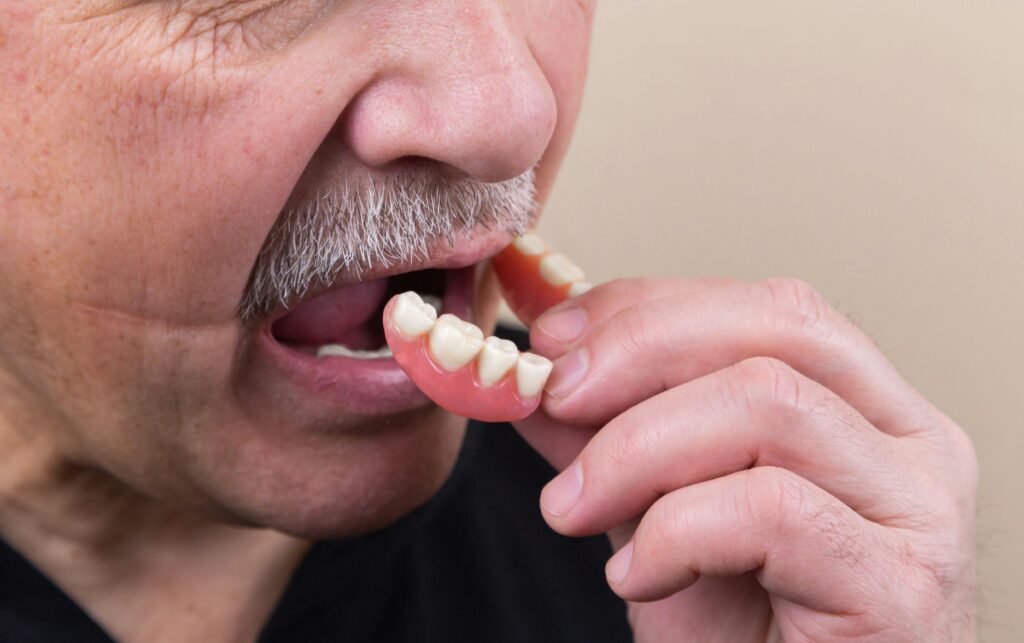Keeping your smile bright and healthy as you age is vital to your overall well-being and quality of life. It’s more than just aesthetic appeal, it’s about maintaining a healthy mouth and preventing dental diseases that could compromise your overall health. That’s why we’ve put together a comprehensive guide called “Smile Brighter: A Guide to Maintaining Dental Health for Seniors”, providing you with invaluable insights and practical advice on how to take care of your teeth and gums as you grow older.

In this guide, we will delve into a range of topics specifically curated for seniors. We will discuss the common dental health issues faced by the older demographic, how to prevent these problems, and the best dental practices to uphold. Not only that, but we will also explore the latest dental technologies and innovations that can help seniors maintain a bright and healthy smile.
Rest assured, we’ve consulted with experts in the field to ensure that all information shared in this guide is both accurate and actionable. From understanding the link between oral health and general health to learning about the right nutrition for dental health, this guide will be your ultimate resource. Let’s work together to keep those pearly whites shining brightly for years to come.
Understanding the Importance of Dental Health for Seniors
As we age, maintaining dental health becomes increasingly important—not just for a confident smile, but as a critical element of overall health and quality of life. Seniors face unique oral health challenges due to natural aging, chronic medical conditions, medication side effects, and physical or cognitive limitations. What may begin as minor discomfort can easily escalate into significant health concerns if left unaddressed.
For older adults, oral health is directly tied to nutritional intake, immune defense, and systemic health. Issues like tooth loss, gum disease, dry mouth, or oral infections can make it difficult to chew or swallow, potentially leading to reduced appetite, poor digestion, and malnutrition. In some cases, seniors may avoid certain foods altogether due to discomfort, missing out on key nutrients needed for healing and vitality.
Moreover, dental health influences communication and emotional well-being. Missing or damaged teeth may affect speech and self-confidence, contributing to social isolation or depression—particularly for those in long-term care environments or dealing with limited mobility.
Link Between Oral Health and General Health
The mouth is often referred to as the “gateway to the body”—and for good reason. It serves as the first line of defense against harmful pathogens and plays a vital role in overall health regulation. While most of the bacteria in the mouth are harmless, inadequate oral hygiene can allow them to multiply and cause infections, such as tooth decay, gum disease (gingivitis and periodontitis), and oral thrush.
Poor oral health has also been linked to a range of systemic diseases, including:
- Cardiovascular disease: Bacteria from gum infections can enter the bloodstream, potentially contributing to heart disease, clogged arteries, and stroke.
- Diabetes: Gum disease can make it harder to control blood sugar, and high blood sugar can worsen oral infections.
- Respiratory infections: Inhaling bacteria from the mouth may lead to lung infections such as pneumonia, particularly in seniors.
- Cognitive decline: Emerging research suggests a potential link between chronic gum disease and increased risk of Alzheimer’s disease and other forms of dementia.
Compounding the issue, many commonly prescribed medications for seniors—such as antidepressants, antihypertensives, and diuretics—cause dry mouth (xerostomia), reducing saliva flow. Since saliva plays a critical role in neutralizing acids, washing away food particles, and aiding digestion, its absence can accelerate decay and gum deterioration.
Common Dental Problems in Seniors
As people age, the risk of developing dental health problems increases due to physiological changes, chronic illnesses, and the side effects of medications. Seniors often experience cumulative wear and tear on their teeth and gums, making consistent dental care and early detection more important than ever. Here are some of the most common oral health concerns faced by older adults:
🦷 Periodontal Disease (Gum Disease)
Periodontal disease is a chronic bacterial infection that affects the gums and bone supporting the teeth. In its early stages (gingivitis), symptoms may include red, swollen, or bleeding gums. If left untreated, it can progress to periodontitis, leading to gum recession, tooth mobility, and even tooth loss. Seniors are especially susceptible due to weakened immune responses, poor oral hygiene habits, and conditions like diabetes.
💧 Dry Mouth (Xerostomia)
Dry mouth is a frequent issue among seniors and is often caused by medications such as antihypertensives, antidepressants, and diuretics. Saliva is essential for neutralizing acids, preventing decay, and maintaining oral tissue health. A lack of saliva can lead to cavities, oral infections, difficulty chewing or swallowing, and bad breath.
🎗️ Oral Cancer
The risk of oral cancer increases with age, with the average age of diagnosis being 62. Warning signs include sores that don’t heal, lumps or thickened tissue in the mouth, difficulty swallowing, or persistent pain. Because early symptoms can be subtle, regular dental visits are essential for screening and early intervention.
Preventing Dental Problems in Seniors

When it comes to oral health in older adults, prevention is truly the best medicine. By implementing proactive measures, many common dental issues can be avoided or minimized, preserving function, comfort, and confidence well into later life.
- Schedule Regular Dental Checkups: Seniors should visit the dentist at least twice a year, or more frequently if advised. These visits help detect early signs of gum disease, decay, or oral cancer.
- Practice Consistent Oral Hygiene: Brushing twice a day with fluoride toothpaste, flossing daily, and using antibacterial mouthwash can significantly reduce plaque and bacterial buildup.
- Manage Dry Mouth: Staying hydrated, chewing sugar-free gum, and avoiding tobacco or alcohol can help alleviate dry mouth. Dentists may also recommend special mouthwashes or saliva substitutes.
- Use Adaptive Tools if Needed: For seniors with arthritis or limited mobility, electric toothbrushes, water flossers, and ergonomic hygiene tools can make oral care easier and more effective.
- Be Mindful of Diet: A balanced, nutrient-rich diet supports dental health. Limiting sugary snacks and acidic drinks reduces the risk of tooth decay.
Preventing Dental Problems in Seniors
Prevention is better than cure. This adage holds true for dental health as well. Regular dental check-ups and good oral hygiene can help prevent most dental problems in seniors.
Key Dental Care Practices for Seniors
Maintaining dental health for seniors requires daily care and regular visits to the dentist. Here are some essential practices:
- Regular Brushing: Brushing at least twice a day with fluoride toothpaste can prevent tooth decay and gum disease.
- Flossing: Regular flossing can remove plaque from between the teeth and gums, where the toothbrush can’t reach.
- Dental Check-ups: Regular dental visits for cleanings and check-ups can prevent problems or catch them early when they are more manageable.
Choosing the Right Dental Care Products
Choosing the right dental care products can make a significant difference in oral health. Fluoride toothpaste, a soft-bristle toothbrush, and an antibacterial mouthwash are recommended for seniors.
Diet and Nutrition for Dental Health
A well-balanced diet is a cornerstone of strong teeth and healthy gums. What we eat—and how often—can have a profound impact on oral health. Nutrient-rich foods support tissue repair, strengthen enamel, and help prevent common dental issues such as cavities and gum disease.
🍬 Avoid Sugary Foods and Drinks
Sugary snacks, sodas, and sweetened beverages feed harmful bacteria in the mouth, which produce acids that erode tooth enamel and lead to decay. Frequent snacking or sipping sugary drinks prolongs acid attacks, increasing the risk of cavities. Instead, opt for natural alternatives like fresh fruits or unsweetened yogurt and rinse your mouth with water after consuming sweets.
💧 Stay Hydrated
Drinking water throughout the day helps wash away food particles, reduce acidity, and dilute sugars that may linger in the mouth after eating. Water also helps rinse out bacteria and is particularly important if you’re not able to brush immediately after meals.
🥦 Consume a Balanced Diet
Key nutrients play vital roles in oral health:
- Calcium helps maintain strong bones and teeth. Found in dairy, leafy greens, and fortified plant-based milks.
- Vitamin D aids in calcium absorption and can be obtained from sunlight, fatty fish, and egg yolks.
- Phosphorus supports tooth structure and is found in fish, nuts, eggs, and dairy.
- Vitamin C supports gum health and immune function—rich in citrus fruits, berries, and peppers.
Fiber-rich fruits and vegetables stimulate saliva production and mechanically clean the teeth, while whole grains offer B vitamins and iron that benefit gums and soft tissue health.
The Role of Hydration in Dental Health
Proper hydration is often overlooked in oral care, yet it’s crucial. Staying well-hydrated supports saliva production, which is the body’s natural defense against tooth decay. Saliva neutralizes acids produced by bacteria, aids in digestion, and helps rebuild tooth enamel through remineralization.
A dry mouth (xerostomia), often caused by medications or dehydration, increases the risk of cavities, gum disease, and bad breath. Drinking water throughout the day—especially after meals—helps maintain a healthy pH balance, protects soft tissues, and keeps your mouth fresh and comfortable.o different when it comes to dental health. Hydration helps maintain saliva production, which is crucial for neutralizing bacteria and aiding digestion.
Managing Dental Health Challenges in Seniors
As we age, maintaining oral hygiene can become increasingly challenging due to physical limitations, cognitive decline, or the presence of chronic conditions. Yet, dental health remains a critical component of overall well-being for seniors, impacting everything from nutrition and speech to self-esteem and systemic health.
For many older adults, conditions such as arthritis in the hands and fingers can make daily brushing and flossing difficult and even painful. In such cases, adaptive tools can make a significant difference. Electric toothbrushes with large handles and floss holders or interdental brushes can improve ease of use and efficiency. These tools are designed to minimize effort while maximizing oral cleanliness, helping seniors maintain independence in their hygiene routines.
Cognitive conditions like Alzheimer’s disease and dementia introduce a different set of challenges. Seniors may forget to brush and floss, or even resist care altogether. Caregivers play a vital role in these cases, often needing to provide verbal reminders, physical assistance, or incorporate oral care into established routines to ensure consistency.
Dental Care for Seniors with Dentures
For seniors who wear dentures, oral hygiene is just as important. Dentures are not a “set-it-and-forget-it” solution—they require regular and proper care to avoid issues such as gum irritation, bacterial growth, and unpleasant odors. Dentures should be removed daily and cleaned thoroughly with specialized denture cleansers (never regular toothpaste, which can be too abrasive). This routine helps prevent plaque buildup and maintains the integrity of the appliance.
It is equally essential to give the oral tissues time to breathe. Health professionals recommend removing dentures for at least four to six hours per day, preferably at night, to prevent conditions such as denture stomatitis, a common fungal infection caused by ill-fitting or unclean dentures.
Routine dental visits remain crucial even for seniors without natural teeth. Regular checkups allow for monitoring of gum health, the fit of dentures, and early detection of oral conditions like dry mouth, lesions, or even oral cancers, which are more common in older adults.
Conclusion
In conclusion, maintaining dental health is essential for seniors to keep a healthy lifestyle and bright smile. The “Smile Brighter: A Guide to Maintaining Dental Health for Seniors” offers valuable information and actionable advice for older adults to maintain their oral hygiene. Regular dental check-ups, proper cleaning routines, balanced diet, and awareness of oral health issues are some of the key takeaways. It’s clear that oral health is a crucial part of overall wellness and should not be overlooked, especially as we age.
Moreover, this guide enlightens us on how some oral health issues are linked to other health conditions like heart disease and diabetes, demonstrating the interconnectedness of our health. To ‘smile brighter’, seniors must embrace these suggested practices and consider dental health as a priority. Remember, it’s never too late to start. A proactive approach can significantly reduce the risk of dental problems, ensuring a better quality of life and a sparkling smile even in the golden years. After all, a healthy smile is a beautiful smile.



